Description
THERMOCOUPLE TYPE K 1000 DEG C RATED
K TYPE THERMOCOUPLES are a very important component part, as it is a sensor that is used to measure temperature. Made from two wires made from different metals, they are able to accurately read a temperature quickly and effectively. This is done by welding together the two wires at one end to form a tip called a junction. The junction is where the temperature is measured on a K Type Thermocouple, creating a milli-voltage when the junction sees a change in temperature. This signal is then calculated by a temperature controller to give an accurate temperature reading.
Along with type J, a Type K Thermocouple is one of the most common around. Here at Cartridge Heaters, we stock both types, in 3mm and 6mm diameters and in various lengths to meet your specific requirements.

K Type Thermocouples
With their simple and effective use and many advantages, K Type Thermocouples are the most popular thermocouple temperature sensors on the market today. While they may be more expensive than their J Type counterparts the K Type Thermocouple is arguably the more versatile of the two. This is because they are able to withstand some of the highest temperatures from 0°C – 1260°C. This higher temperature range makes K Type Thermocouples much more useful at extreme temperatures than the J-type. However, if you’re looking for a thermocouple to perform well at lower temperature ranges and offer better value for money, you may want to opt for the J Type Thermocouple.
Not only does K Type Thermocouples have an advantage when it comes to an increased temperature tolerance range, but they also excel in terms of resistance and capability, due to their different metallic makeup. Whereas a J Type Thermocouple is made up of iron and constantan, K type Thermocouples are composed of a nickel/chromium alloy (chrome) and a nickel/aluminium alloy (alumel) which gives them much better protection against oxidation and acidity than the iron limbs of the Type J.
K Type Thermocouples are therefore perfect for use in oxidative environments and environments with a corrosive atmosphere or when immersed in an oxidative or corrosive fluid. You can be sure you can rely on them in more extreme environments in which an exact temperature needs to be calculated. In fact, the K Type Thermocouples work most effectively in a clean oxidising atmosphere, where a J Type may be oxidised and damaged. The K Type Thermocouples are also more useful at very high temperatures – up to 1260°C – allowing you to accurately measure temperatures even at these heats.
However, their slightly increased cost compared to J Type Thermocouples helps to ensure that the Type J continues to see use throughout lower-temperature applications and in non-oxidising atmospheres, which perfectly suits its temperature-measurement ability. As temperature sensors, the K Type Thermocouple wire and J Type Thermocouples may be superficially similar, but they are suited to a wide range of applications.
For more information on temperature sensors, including Type J Thermocouples and Type K Thermocouples, and for more information on their applications and uses, feel free to call the experts at Cartridge Heaters on 0121 439 8932. We understand that figuring out exactly which you need can be difficult to do without the help of an expert, so be sure to get in touch with our friendly team today. They will be more than happy to help you find the perfect temperature sensor for your needs!
K Type Thermocouple FAQ’s
How does a K Type Thermocouple work?
A K Type Thermocouple is used to read an exact temperature through voltage and electric current. To do so, the device contains two different alloy junctions, that are joined together at one end. They are then connected to a specialist thermocouple thermometer, like the K Type thermocouples provided by Cartridge Heaters.
To work out the temperature, the temperature of the hot junction is changed, in comparison to the cold junction that is usually set at 0°C. This creates a voltage level that is able to help you work out the temperature differential between the two.
If you’d like more information on how a Type K Thermocouple works to achieve an exact temperature, speak to one of our expert team today and we will gladly speak through your enquiries with you.
How to test a K Type Thermocouple
Here at Cartridge Heaters, we are proud to offer a range of high-performance K Type Thermocouples that will be sure to last you for a long time. Their durability is sure to provide excellent value for money, but every once in a while, they may need to be checked. As with any component, they could fail and cause disruption to your operations.
It’s with this in mind that you may want to test them to review their performance. To do this, you will need a multimeter to perform an open circuit, closed circuit, or resistance test.
When testing resistance, you will have to remove your K Type Thermocouple from the application and place one lead on the side of the thermocouple. A resistance reading should show if your thermocouple is still operating correctly.
For an open circuit test, again remove the thermocouple from the application but set the multimeter to millivolts. Place one lead on the side of the thermocouple and the other at the opposite end, with the end in the application being heated. An acceptable reading shows that your thermocouple is still working.
A thermocouple adapter is needed for a closed-circuit test. This adapter is used within the application, with the thermocouple screwed into the adapter as the other is attached to the exposed end of the thermocouple. Be sure to activate the application in order to achieve a reading.




